French Strike Disrupts Rhine River Traffic
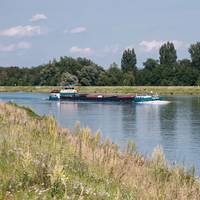
Rhine river traffic came to a standstill in some places on Wednesday due to strikes against French government plans to raise the pension age, with sections of the river in France, Germany and Switzerland affected, a CGT union representative and Germany's Waterways and Shipping Administration (WSA) said.Around 1.28 million people in France had participated in a sixth day of protests on Tuesday against a draft law that would see the pension age delayed by two years to 64.A blockade at Strasbourg lock on the Rhine was cleared by police and an evacuation of the blockades at the Marckolsheim lock…
Port of Rotterdam Freight Volumes See Biggest Drop in Decade, But Smaller Than Expected
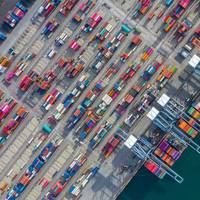
Freight volumes in the Port of Rotterdam fell 6.9% in 2020 because of the coronavirus crisis, the biggest drop in about a decade but smaller than had been expected, Europe’s largest sea port said on Friday.The port's Chief Executive Allard Castelein told reporters he expected a recovery that began in the second half of 2020 to continue this year but said throughput was not expected to reach pre-crisis levels in 2021.The fall in traffic in 2020 was the largest since 2009, taking throughput down to levels last seen in 2011, he said.Traffic took a big hit in the first phase of the pandemic, as tr
Rotterdam Port Continues to Grow in Q3
The Port of Rotterdam announced a 1% rise in cargo handing, after it handled 112.4 million tonnes of freight, meaning that the total of 353.5 million tonnes were transmitted up to the end of the third quarter.Volume growth was mainly driven by containers, crude oil, LNG and biomass. There was a reduction in the transshipment of coal and mineral oil products.Allard Castelein, Port of Rotterdam Authority CEO: "In the third quarter we again saw healthy growth in terms of containers, one of the Port Authority’s strategic spearheads. What is worrying, however, is that the relationship between the world’s major trading blocs remains strained…
Volume Rises at Port of Rotterdam
Port of Rotterdam posted a record overall freight tonnage in the first quarter of 2019, up 5.1% on the same period last year, thanks to strong growth in container traffic.In total, 123.9 million tonnes were handled compared with 117.8 million tonnes in the same period in 2018."The increase mainly concerned the throughput of containers (+7.3% in TEU, +5.9% in tonnes) and fuels. Mineral oil products, iron ore and scrap throughput fell," said a press release from the largest port in Europe, located in the city of Rotterdam.Allard Castelein, CEO Port of Rotterdam Authority: "We had an excellent start to 2019 with record throughput volumes in the first quarter.
Rotterdam Port Achieves TEU Milestone in 2018
Europe's largest port, the Port of Rotterdam ended 2018 with a total container throughput at 469.0 million tonnes (MT) which slightly higher than in 2017, which was itself a record year (467.4 MT).Container transhipment was the engine of growth again, with a 4.5% increase in tonnage. Measured in TEUs, the standard unit for containers, the increase was 5.7% and the annual total was 14.5 million TEUs – also a record.This strengthens the position of Europe’s largest container port in this strategically important market segment. Significant underlying shifts were observable in the goods segments.Whereas container transhipment continued to grow at a healthy pace, that of crude oil, mineral oil products and agribulk fell.
Rotterdam Port Awards Green Award Discount for Vessels
The Port of Rotterdam Authority will widen and facilitate the Green Award discount for sea-going shipping from the start of 2019.The discount will encourage safe and green shipping in the liquid bulk segment. From 2019 onwards, certified chemical tankers and sea-going vessels with a cargo capacity (DWT) of less than 20,000 tons may also make use of the scheme.Also new for 2019 is that the Port Authority is making the port dues process more customer friendly for shipping lines whose vessels call at the Port of Rotterdam. In close collaboration with the market, the billing process will be more complete, quicker and more transparent. The changes to the billing of seaport, buoy and dolphin dues, together with waste charges will be implemented first.
Koole Terminals Acquires Odfjell Terminals Rotterdam
Odfjell Terminals entered into an agreement with Koole Terminals B.V. of the Netherlands (Koole) to sell its 100% ownership of Odfjell Terminals Rotterdam (OTR).The sale will generate USD 100 million of cash proceeds to Odfjell. Odfjell announced that the transaction has closed.According to Koole Terminals, Odfjell Terminals will be rebranded to Koole Tankstorage Botlek (KTB). Located in the heart of the Port of Rotterdam, KTB stores both chemical and mineral oil products and operates a PID facility.John Kraakman, CEO Koole Terminals: “We are pleased to extend our terminal network and will work hard to transform KTB further into a state of the art terminal, where safety is our priority number one.
Port of Rotterdam Throughput Drops 2.2% in 1H 2018
The port of Rotterdam achieved throughput of 232.8 million tonnes in the first six months of 2018. That is 2.2% less than in the first six months of 2017.Container throughput, one of the strategic priorities of the Port Authority, rose by 5.9% (in tonnes, 6.2% in TEU) by comparison with the first six months of 2017, including a new throughput record in May.The market share of Rotterdam by comparison with the other ports in the Hamburg-Le Havre range increased from 30.9% (Q1 2017) to 31.2% (Q1 2018)¹However, the rise in container handling did not offset the fall in the throughput of wet and dry bulk. The decline in bulk goods was mainly seen in the throughput of coal…
Port of Rotterdam Freight Throughput Falls in 1Q
In the first quarter of 2018, 1.2% less freight passed through the Port of Rotterdam than in the same period last year. In total, 117.8 million tonnes were handled against 119.3 million tonnes in the same period in 2017. The fall mainly concerned the throughput of coal, iron ore, scrap and crude oil. In contrast, the growth in container throughput continued to increase significantly (+6.1% in TEU, +4.6% in tonnes). The throughput of mineral oil products increased, particularly distribution. The throughput of biomass and LNG increased spectacularly. Allard Castelein, CEO Port of Rotterdam Authority: “The continued growth in container…
Rotterdam Port Sets Dues for Three Years
The port dues for the port of Rotterdam have been set for the coming three years. The port dues will rise by 1% per year for the next three years. Over the recent period, fixing the development of port dues for three years has provided the market with a lot of clarity. It is for this reason that, after constructive talks, the Port of Rotterdam Authority, Deltalinqs, VRC and VNPI have again decided upon a multi-year agreement. Rotterdam is using this conservative rate of increase in port dues to increase its competitive position among the surrounding sea ports. The Port Authority has adopted these specific measures to strengthen Rotterdam’s position as a container hub.
Rotterdam Boosts Container Throughput
The number of containers handled in the port of Rotterdam continues to grow. In the first nine months of 2017, the throughput of containers increased by 10.1 percent compared to the corresponding period in 2016, to a total of 10.2 million units (TEU). The port’s total throughput in that same period increased by 2 percent. In addition to containers, the key contributors to this overall growth were the agribulk and breakbulk segments. The port recorded a drop in the throughput of liquid bulk like mineral oil products. A total of 351.5 million tonnes was handled in the period until the end of September. Allard Castelein, CEO of the Port of Rotterdam Authority: “Thanks in part to the 10-percent increase in container throughput volumes, this has proven a fine quarter for our port statistics.
Rotterdam Port Throughput Up by 3.9%
With an increase in throughput of 3.9%, the port of Rotterdam can look back a good first half year. There was growth in eight of the ten market segments. The only falls were in the volumes of mineral oil products and other liquid bulk. In particular, the volume of containers handled (9.3% in TEU, 10.4% in tonnes) was the determining factor for the overall growth in throughput. Dry bulk increased (5.2%), liquid bulk decreased slightly (-1.0%) and break bulk was very much on the rise (10.8%). A total of 238.0 million tonnes of goods were handled in the first half of the year. The market share of Rotterdam by comparison with the other ports in the Hamburg-Le Havre range increased from 29.0% (Q1 2016) to 30.9% (Q1 2017) in the container sector.
Rotterdam’s Container Volume Grows by 8.8% in Q1
In the first quarter of 2017, 2.0% more goods passed through the Port of Rotterdam than in the same period last year. The growth in the container sector (8.8% by volume (TEU), 10.8% by weight) is particularly striking, says a press release from the company. Of the 11 different commodities, only mineral oil products and other liquid bulk showed a decrease. The total throughput volume increased to 119.3 million tonnes. Allard Castelein, CEO of the Port of Rotterdam Authority: “For containers, this was the best quarter ever, and March was a record month. The Rotterdam container companies have performed strongly in a market experiencing only limited growth. In the liquid bulk segment, more crude oil (+2.3%; 26.6 million tonnes) and more LNG (+65.6%; 0.2 million tonnes) was handled.
Rotterdam Port Throughput Slips
Compared to the excellent first three quarters of 2015 (+5.4%), cargo throughput in the same period this year fell by 1.9%. The decrease was particularly strong in coal and iron ore. Allard Castelein, CEO of the Port of Rotterdam Authority: “Each of the different sectors in the port has its own dynamic. The 1.9% decrease is consequently the sum of a number of different developments. Last year, throughput in the port increased by 4.9%, to 466 million tonnes. Castelein: “Throughput figures only tell part of the story. Throughput in liquid bulk fell by 0.4%, to 160.0 million tonnes. The volume of crude oil handled in the port saw a 1.6% decrease. While the refineries’ margins are still positive, they are smaller than last year.
Rotterdam’s Q1 Port Throughput Matches 2015
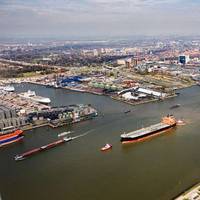
The Port of Rotterdam handled roughly the same volume of cargo in the first quarter of 2016 as in the same period last year, as an increase in the volume of, mainly, crude oil and oil products put through the port was offset by a more or less equivalent decrease in the volume of dry bulk and containers. The total volume of cargo handled in the port increased by 0.2 percent, to 116.9 million metric tons. “The port’s throughput grew by 4.9 percent in 2015. Our ambition is to match this high throughput volume in the present year,” said Port of Rotterdam Authority CEO, Allard Castelein.
Shell to Charter 15 LNG-powered Barges
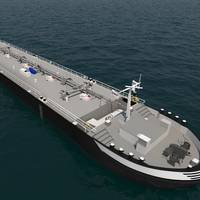
Shell Trading Rotterdam BV (Shell) has signed a time-charter agreement with Plouvier Transport NV and Intertrans Tankschiffahrt AG for 15 new inland dual-fuel barges, which will predominantly run on Liquefied Natural Gas (LNG). The barges, built by the Dutch shipyard VEKA Shipbuilding BV, will support Shell’s business in trading and transporting mineral oil products in the ARA (Amsterdam-Rotterdam-Antwerp) and Rhinetrack (Germany/Switzerland) regions. Dr. Grahaeme Henderson, Vice President of Shell Shipping & Maritime said…
Castrol GreenField Takes Environmental Lead
Castrol Offshore said its GreenField lubricants is likely to remain the only products fully tested to environmentally-responsible standards set by Norwegian authorities through 2011. Changes to Norwegian Activities Regulations introduced on January 1st 2010 require discharged lubricants and chemicals, used in closed systems in amounts of more than 3000kg a year per facility, to be registered for use offshore. Applications including crane hydraulics, thrusters, drilling system hydraulics and mooring winch gears, require Harmonised Offshore Chemicals Notification Format (HOCNF) registered products. Castrol Offshore proactively registered its products before the January 1st 2010 deadline. NEMS database.
Port of Rotterdam Throughput Up by 0.6%
The port of Rotterdam achieved steady results in the first half of the year. Total throughput increased by 0.6% compared to the first half of 2013. The throughput of crude oil increased by 3.3% while that of mineral oil products decreased by 13.5%. The throughput of coal grew by 9.5%, while ore throughput stayed virtually the same. Container throughput, measured in tonnes, increased by 2.7% or 1.9% when measured in TEUs. Throughput saw a small decrease of 0.2% in the first quarter, but was slightly positive in the second quarter, causing throughput in the first half of the year to increase by 0.6%. A further recovery of the European economy is expected for the second half of the year, so that the port is on track in terms of achieving approximately 1% growth for all of 2014.
VGP-compliant Lubricants with a Pedigree
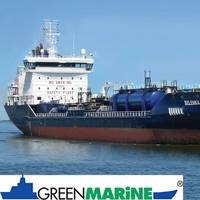
With nearly 30 years experience in producing environmentally-considerate lubricants, PANOLIN offers its VGP-compliant Greenmarine products to help owners and operators meet the imminent EPA requirements. Unlike most trying to comply with the EPA VGP, PANOLIN say that their products are not a newcomers on the market. Some of the world's largest hydraulic equipment OEMs have relied on PANOLIN products for decades. PANOLIN Greenmarine lubricants use fully saturated synthetic esters and specially developed additives to achieve 100% VGP and sVGP compliance without sacrificing performance.
Koole Expands Rotterdam Operations
Koole Terminals has begun operations at the storage facility for petrol and diesel in Pernis that it recently acquired from BP. The companies have a long-standing relationship. The newly acquired terminal is adjacent to the existing Koole terminal. The acquired terminal has a capacity of 200,000 cubic metres. It has its own jetty for sea-going vessels and a loading station for tankers. The terminal is connected to the BP refinery in Europort by pipeline. BP is leasing back part of the storage facility it sold to Koole, as well as the truck loading station, on the basis of a long-term contract. Koole Terminals has terminals in Zaandam, Rotterdam, Amsterdam and Nijmegen in the Netherlands, and in the United Kingdom and Poland, with a total capacity of two million cubic metres.
Internal Waterway Shipping 2008 Results
Now at 12.2 million tons, the volume of goods carried between the Port of Hamburg and the hinterland by inland waterway vessel in 2008 exceeded all previous levels. This marked a 1.5 percent increase on the operating results of the previous year. In Germany as a whole, the shipment of goods by inland waterway vessel in 2008 dropped by 1.6 percent. The most important goods categories were mineral oil products, gases, coal and agricultural and forestry products. The latter chalked up the highest rate of growth last year, followed by chemical products, fertilizers and finished and semi-finished goods, which are generally carried by container. Container transport is of special importance for the Port of Hamburg.
Port of Hamburg on Growth Course
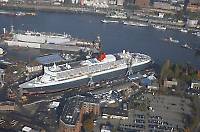
In 2013 the Port of Hamburg achieved total throughput of 139 million tons. That represents growth of 6.2 percent. Both general cargo handling totalling 96.8 million tons (+ 5.7 percent) and bulk cargo handling at 42.3 million tons (+ 7.2 percent), ensured above-average growth for Germany’s largest universal port. “The Port of Hamburg‘s throughput trend is a fine signal for Hamburg and the entire Metropolitan Region. Growth of 6.2 percent is a most impressive result, underlining the tremendous effectiveness of port and logistics companies in Germany‘s largest universal port…
Rotterdam port's throughput almost stable
The Port of Rotterdam’s throughput in the first quarter of 2014, at 109 million tonnes, was 0.2% below the level for the corresponding period last year.Split up by goods type, less crude oil (-2%), mineral oil products (-14%) and other liquid bulk cargo (-14%) were transferred. On the positive side, iron ore and scrap (+5%), coal (+15%), agribulk (+69%), other dry bulk cargo (+13%), containers (+1%), roll on/roll off (+9%) and other mixed cargo (+9%) did better. CEO Allard Castelein of the Port of Rotterdam Authority said, “The falling tendency of the second half of 2013 continued initially, but thanks to a strong month in March, the throughput in the first three months nonetheless stayed almost the same.





